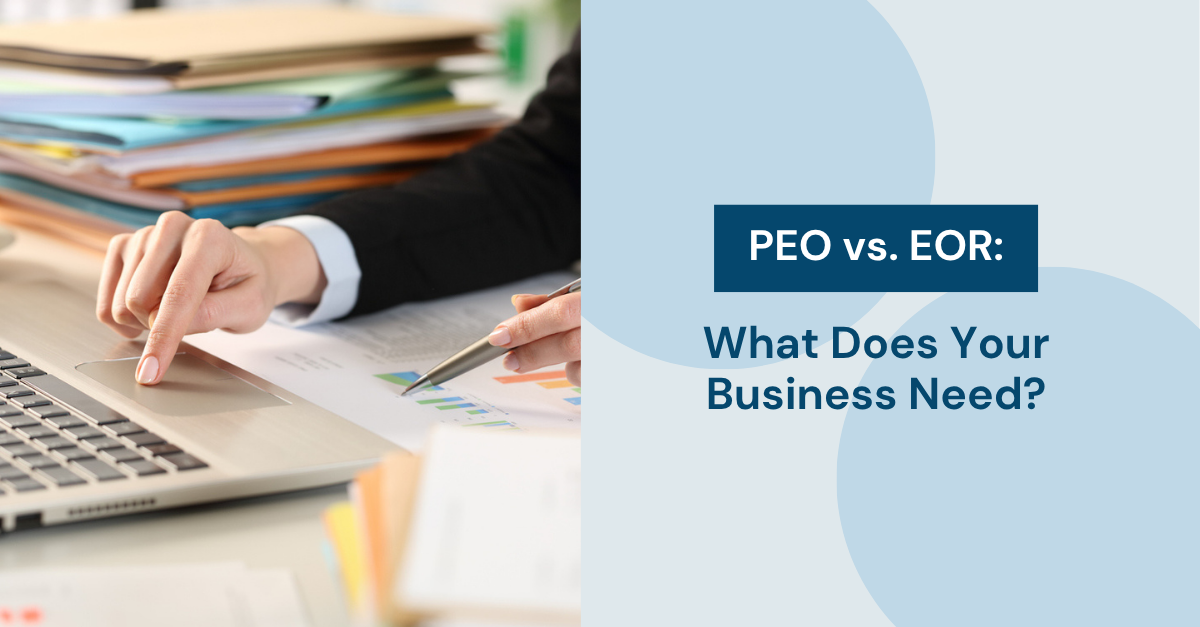
Are you looking for a business partner to take on your payroll, benefits, or compliance responsibilities, but have no idea where to start in your search?
Maybe you’ve heard about Professional Employer Organizations (PEO) and are curious what one could do for your business. Or you may have also caught wind of what an Employer of Record (EOR) organization is. Now, you’ve found yourself at a fork in the road deciding if you need a PEO vs. EOR.
There is a third path you can take for back office support.
Enter ESSG. We’re not a PEO, and we’re more than an EOR. ESSG is here to be your flexible, strategic partner and help make sense of options to fulfill your business’s needs so that you can focus on what you do best: growing your business.
Let’s break down the differences between what business owners can expect when partnering with a PEO, EOR, or ESSG to help you decide what is right for your organization.
Defining a Professional Employer Organization (PEO)
A Professional Employer Organization (PEO) is a co-employer that helps with human resource (HR) duties like payroll processes and risk mitigation. While it supports compliance and stays up-to-date with the latest regulations, it doesn’t provide any additional insurance other than just workers’ compensation coverage (such as general liability).
In a PEO model, your unemployment rate will stay with you, as well as your workers’ compensation experience rating. Any of your employee benefits will be underwritten based on your company’s risk exposure and for the size of your group.
It’s also important to note that the PEO is registered to do business in the state where you have employees. This can effectively limit the opportunities for a staffing agency based on worksite size and location. PEOs may or may not be registered in multiple states, and each state has its own rules on how PEO relationship responsibilities are handled. This can be a very cumbersome process and it can limit your risk mitigation.
Working with a PEO might be right for your business if:
- You don’t have a strong HR department
- You don’t have employee benefits to retain and attract talent
- You struggle to secure affordable workers’ compensation insurance
At the end of the day, PEOs help support some HR functions, but they come with more rules, regulations, and complexity.
What is an Employer of Record (EOR)?
An Employer of Record (EOR) is a third-party entity that legally employs the workforce and takes on minimal risk and responsibilities. Its duties are only to pay employees and take on the workers’ compensation risk.
This kind of organization is built for a more global workforce for contract labor, while a PEO tends to have more service offerings and benefits for long-term employees.
EOR services handle the legal and administrative aspects of employing individuals, especially when expanding into new countries or hiring remote teams. EORs act as the legal employer, taking responsibility for payroll, taxes, benefits, and compliance with local labor laws. They essentially streamline the process of hiring and managing a global workforce without the need for a company to establish a local entity.
Working with an EOR might be right for your business if:
- You are looking to expand into a new state or you already have locations in more than one state
- Your organization employs workers outside of the U.S
- Your HR department needs additional legal and administrative support
Not a PEO or an EOR: We’re ESSG
We are more than a PEO or just an EOR. ESSG is a hybrid solution that delivers more back office solutions for staffing agencies and small businesses.
We’ve carved a new path for businesses to help them maximize their potential. Leveraging large numbers, we help reduce operational costs while allowing businesses to offer a range of insurance benefits for customers, clients, and employees.
By working with ESSG, businesses can offload HR duties like compliance, payroll, benefits management, and more. We stay up to speed with the most current regulations, and businesses that turn to ESSG can fully alleviate these responsibilities from their plate while mitigating their risk, reducing errors, and streamlining operations.
At a more granular level, ESSG helps support critical business documents, procedures, and policies. This includes employee handbooks, safety and training protocols, non-discrimination best practices, promotion and compensation, and discipline and termination.
We offer the flexibility of an EOR with the benefits of a PEO, so you can concentrate on driving your business forward. For more than 20 years, we’ve helped our staffing agency clients with services such as:
- Reducing overhead, turnover, and administrative burdens
- Navigating insurance costs
- Managing payroll funding
- Providing extensive employee benefits
- Ensuring accurate payroll and tax filing
- Drafting and maintaining anti-discrimination and harassment policies
- Standardizing onboarding and safety training
- Staying ahead of employment law changes
- Ensuring fair and consistent recruitment, hiring, advancement, and termination practices
- Mitigating risk at every stage of the employee lifecycle
Simply put: ESSG takes on more of the heavy lifting around HR and employer responsibilities so that business owners can focus more effort toward other business operations.
By partnering with us, you can reduce risk, lower your operating cost, boost compliance, and free up time to focus on growth. It’s a win-win.
Ready to take the next step? ESSG has your back all the way. Let’s make it happen.
About the Author
Chris Levine
Chris Levine has been the CEO of Employer Solutions Staffing Group since it was founded in 2005. He is the primary contact for new business development. Mr. Levine oversees the Company’s strategic direction and coordinates sales efforts, focusing on growth and improving operational efficiencies. He actively manages workers’ compensation risk and claims management. Prior to working at ESSG, he worked in sales with a Fortune 500 car manufacturer. Mr. Levine began his career as a pilot for Alaska Airlines. Mr. Levine holds a degree in Aviation Management from Metropolitan State University.



